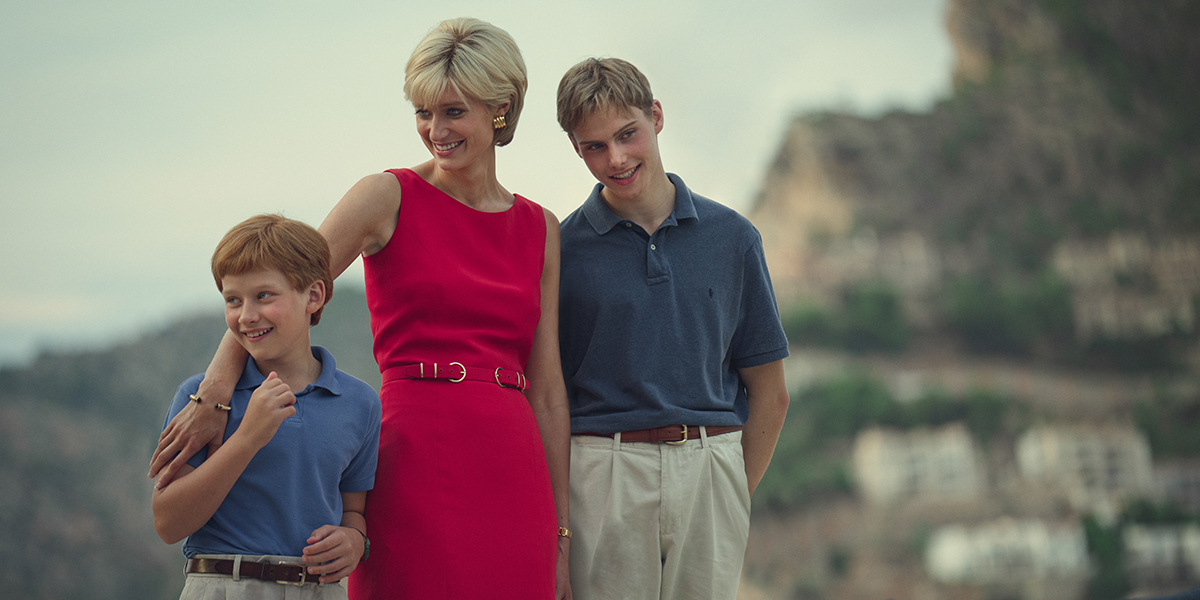At the end of the first episode of Netflix’s The Crown Season 6, Princess Diana (Elizabeth Debicki) enters her Kensington Palace rooms. She finds them filled with red and fuschia roses. A small case is on the table. It contains a beautiful watch of gold and diamonds, a present from her latest love interest – Dodi Al-Fayed (Khalid Abdalla). Inside the box is a card that reads: Paris next week?
Diana, you whisper to the screen, don’t go to Paris. Stay and fulfill the role you were born to play – a modernizer of the Royal Family. We know what happens 23 minutes past midnight at the Pont de l’Alma tunnel.
With the tragic death of a beautiful princess, The Crown, a six-part series chronicling the reign of Queen Elizabeth II (played majestically in Seasons 5 and 6 by Imelda Stanton), comes to a close. The series started seven years ago with the Queen’s wedding to Philip Mountbatten in 1947 and ends with the wedding in 2005 of Prince Charles and Camilla Parker Bowles.
It has been a fantastic ride. The 60 episodes of prestige long-form television, written mainly by Peter Morgan, hooked 73 million viewers worldwide and won 21 Emmys out of 69 nominations.

Wielding a bag full of poetic license, Morgan gilded the family’s problematic (and sometimes scandalous) generational change as it sat at the center of national and international politics. He embedded in our collective psyche one of the most enduring portrayals of the British Royal Family to date and closed the saga well, although not everyone agrees.
The last season of The Crown has been criticized, especially by the British press. The critics turned their noses up at ghosts that converse with the living (Diana and the younger Queens – Clarie Foy and Olivia Coleman), at-times robotic script, the embellishment of historical fact, made-up dialogue, and the repetition of the worn-out storylines with Dodi and Diana, Charles and Camilla, and now William and Kate. Some have even called Season 6 a damp squib.
Yet, for many who watched it, including myself, The Crown hasn’t strayed. It is always an opulent iteration of a royal soap opera with historical undertones. The story and its personalities – especially The Queen and Diana – pull you in. The closeness to the present and the familiar storyline keep us watching.
As the first scenes play out in Paris, I bet many people remembered where they were or what they were doing when they heard the news that Princess Diana had died. That makes it hard to watch her last days. The sound of the Paparazzi’s clicking cameras, the blinding lights, and the roar of the motorbikes chasing the Princess’s car at high speed bring it all back. The sound of the crash makes it real.
For me, one of the most poignant moments of this last season is Princess Margaret’s (Lesley Manville) last scene, when she says goodbye to her beloved sister. “I will always be by your side, no matter what,” she says. What a sad life.

But what I found groundbreaking was Abdalla’s portrayal of Dodi Al Fayed, his relationship with Diana, and how it defined who she was. “One of the things that I am proudest of with Dodi,” Abdalla says in an interview on TikTok, “Is that finally, after 26 years of living on supermarket shelves and people not knowing anything about him, he can be mourned.”
“I feel a debt of gratitude to Diana for that moment,” he said to the entertainment site Etalk. “I feel there was something in her gaze towards people, and this is part of the reason she was loved, which saw people through the light that shown inside them and not the color of their skin or their status.”
As I near the end of the series, I start to think that the Royal Family, for all its grander settings, is similar to our own. Or, as Morgan said in a recent New York Times interview, the Royal Family is “like a shadow family for everyone, which is why people have such strong opinions.” If you think about it, their emotions are familiar; we all have them. It’s unresolved anger, feelings of guilt, resentment, or betrayal – more than anything, not feeling loved.
Being beautiful, rich, and royal can’t protect them from sadness, loss, and mortality. Even the Queen can’t escape thoughts of death, asking herself, “What about the life I put aside, the woman I put aside when I became queen?” as she contemplates her funeral plans.
In the end, The Crown leaves us with the image of a Queen who is not only royal but human. I wonder if she ever accepted that Diana would have changed the monarchy for the better. Watch the series – it won’t answer that question but will pose many others.

